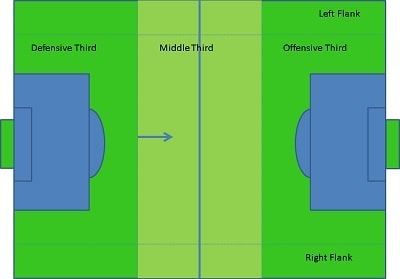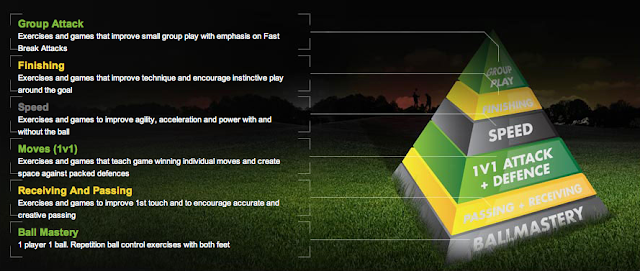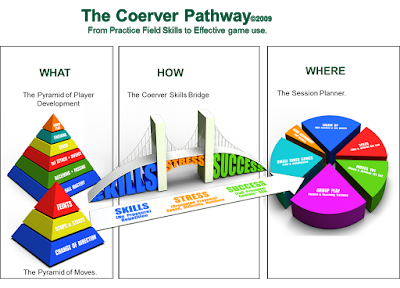|
Being a youth coach over the last 20 years has provided me with a whole host of experiences with players and parents. Predominantly, these experiences have been positive and even life-changing for me. However, I have also seen my share of difficult experiences between players and their parents, parents and officials, parents and parents, and parents and coaches. These negative experiences can have a lasting impact on anyone involved and it's important that we ALL work to keep athletic experiences positive for our sons and daughters. Below is advice for parents that I have shared over the years. Although it was initially written for basketball parents, many of the points apply to parenting in general. The following advice is borrowed from Coach Morgan Wooten. Coach Wootten is a legendary coach who led the DeMatha High School boys basketball program in Hyattsville, MD, from 1956-2002. He won 1,274 games and has a winning percentage of 86.9%
5 Comments
In soccer, you will often hear these two terms- finishing and shooting- interchangeably. But they have very distinct meanings that all players must understand. Having the ability to shoot, does not mean you can finish. Key Concepts:
I'm not trying to minimize the skill involved in finishing versus shooting. Both attempts on goal require players to utilize particular mechanics and techniques that players must practice regularly and independently. Through practice, players learn where and how to strike the ball to create the type of shot they want to produce. another difference includes how hard players strike the ball- shooting will often require power, whereas finishing often requires finesse. For my teams, shooting also serves a secondary purpose. Shooting from distance early in a match can force defenses to step forward and defend higher up the pitch. Therefore, I will often coach my teams to take shots from 20+ yards away from goal in order to force the defenders to worry about shots from distance. This creates space behind the defenders for attacking players to run into and create chances for finishing on goal. Finishing requires players to make decisions quickly in tight spaces and requires various techniques and surfaces of the foot or head- inside/outside/laces. Due to the limited time often afforded players in front of the ball, they must practice one-touch and two-touch shooting in this space. These are often scrappy goals that develop from mistakes and scrum-like conditions. The final key, in both shooting and finishing, is going to be repetition. The higher the number of reps a player takes, the more they will perfect their technique and mechanics. It isn't as easy to do during indoor, but I would often advise my players to either stay after training sessions or spend time independently working on shooting and finishing- this may include taking free kicks and corner kicks.
Types of Shots
Having a cohesive tactical approach to attacking play can have great benefits for any team. Successful teams have players who understand those roles and tactics on the entire field. However, being creative in the final third of the field is what produces goals . . . and hopefully success! First of all, let's define what we mean by the "final third". We often divide the field into thirds in soccer to denote the differing tactics that are used in those areas. The area closest to the team's goal is the defensive third. The middle of the field around the halfway line, and including the center circle, is the middle third. The part of the field nearest to the opponent's goal is what we refer to as the final third. It’s called the final third sometimes because that’s your team’s offensive objective: to build play and finish in your opponents defensive third with a goal. Key Concepts:
Attacking in the final third has two basic components- the build up of attack and finishing. For this post, I am going to focus primarily on building the attack. Building the Attack Coaches have varying thoughts and tactics when approaching the final third. In general, however, you will hear most of our coaches discuss any or all of the following:
In training, we will often run through multiple tactical scenarios to move the ball into the attacking third. Personally, I try to encourage creativity with limited risk- playing a simple pass, playing the way you are facing, playing into space, etc. All of this requires patience. Mistakes often happen when players are impatient and simply get rid of the ball in a direction they think someone should be, not where a teammate is on the field.
Since 2003, I have been a trainer and coach with Lake Placid Soccer Centre (LPSC) which runs player and team camps through St. Lawrence University. LPSC is partly owned by Co-Founder and International Director of Coerver Coaching, Alfred (Alf) Galustian. In 2010, I completed my Coerver Youth Diploma with Alf and continue to believe strongly in the Coerver mission and method. Here's a little information about Coerver Coaching and it's goals: Coerver Coaching is a global soccer coaching program inspired by the teachings of Wiel Coerver and created in 1984 by Alfred Galustian and Chelsea great, Charlie Cooke. Coerver Coaching is:
The ultimate goal of the Coerver Coaching Method is to:
We will be working with Coerver skill development during many of our technical training sessions. In particular, I will focus on an aspect of Coerver skill development called Mirror Moves. These are complimentary attacking moves that allow players to either beat a defender 1v1 or change-of-direction moves to divert play away from pressure. These are components of 1v1 Attack & Defense in the Player Development Pyramid above. |
Coach Shaver"Playing the Beautiful Game" Archives
February 2019
Categories |




 RSS Feed
RSS Feed
